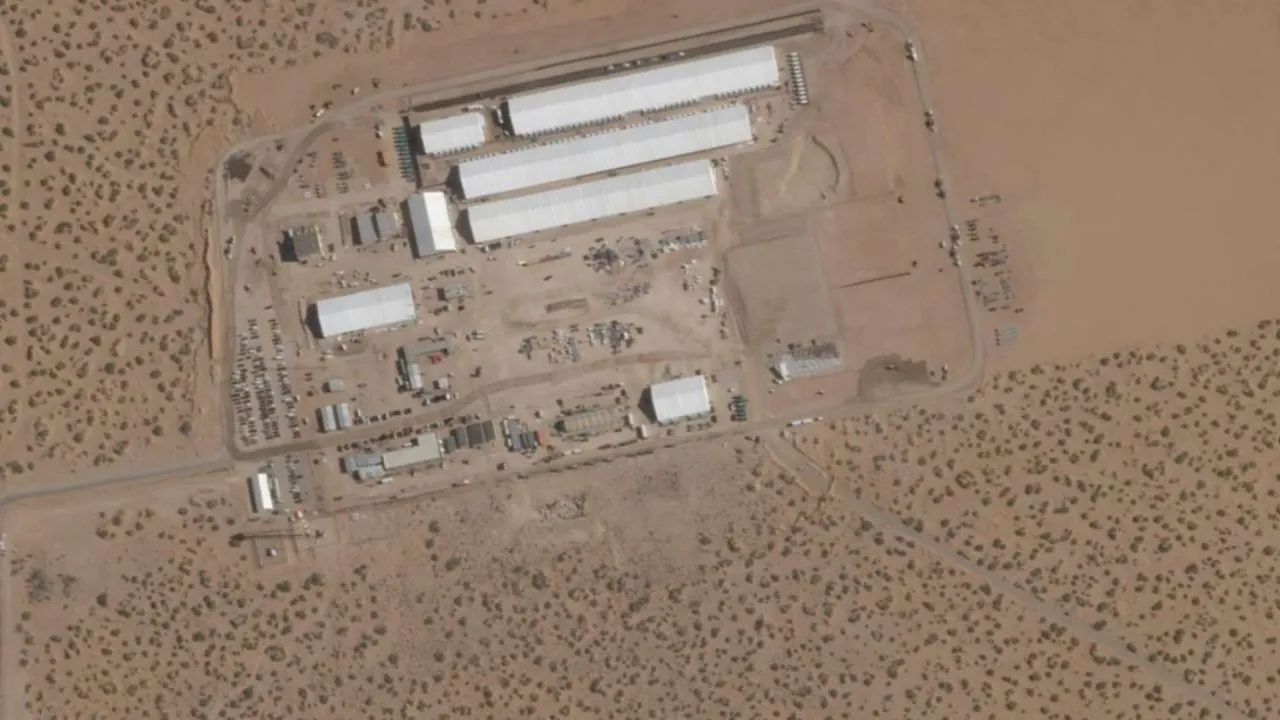Mystery Shrouds $1.2 Billion Immigration Detention Contract Awarded to Virginia Firm

In a move that has sparked widespread scrutiny, the Trump administration awarded a $1.2 billion contract to Acquisition Logistics LLC, a little-known Virginia-based company, to construct and manage the nation’s largest immigration detention facility at Fort Bliss, Texas. The contract, finalized in July 2025, tasks the small firm with building and operating a 5,000-bed tent complex in the Chihuahuan Desert, a project that has raised questions about transparency, qualifications, and the broader implications of the administration’s immigration enforcement strategy.
News in 20 Seconds – Quick Read
A little-known Virginia company, Acquisition Logistics LLC, with no prison experience, won a $1.2 billion contract to build and manage a 5,000-bed immigration detention facility at Fort Bliss, Texas. The secretive and rushed selection process has raised concerns about transparency and the firm’s qualifications. The facility, part of Trump’s mass deportation plan, faces harsh desert conditions and draws comparisons to troubled past detention centers. Legal challenges and questions about potential partnerships with larger prison operators are ongoing.
A Surprising Choice
Acquisition Logistics LLC, headquartered in a modest three-bedroom home in Henrico County’s Tuckahoe District, has no documented experience running correctional or detention facilities. Founded in 2008 by Kenneth Wagner, a 77-year-old retired Navy flight officer, the company has previously secured federal contracts worth no more than $16 million, primarily for logistics and IT support for military agencies. Its designation as a veteran and Hispanic-owned small disadvantaged business grants it preferential status in federal contracting, but the leap to a $1.2 billion deal has left experts and lawmakers puzzled.
The Fort Bliss facility, named Camp East Montana, began accepting its first 1,000 detainees in early August 2025, with plans to scale up to its full capacity of 5,000. The project’s rapid timeline—construction began days after the contract was awarded on July 18—has fueled concerns about oversight and the ability of an inexperienced firm to manage such a complex operation. The Pentagon has declined to release the contract or explain its selection process, citing ongoing litigation, leaving many to question why Acquisition Logistics was chosen over more than a dozen other bidders, including established detention operators.
Lawmakers and Experts Raise Concerns
Rep. Veronica Escobar, a Democrat representing El Paso, where Fort Bliss is located, toured the facility and expressed alarm at the decision to entrust it to a company with no track record in detention management. “Private facilities often prioritize profit over standards,” Escobar noted, highlighting the risk of subpar conditions in a for-profit detention center. The facility’s tent-based design, consisting of three 810-foot-long white tents, has drawn comparisons to the troubled “Alligator Alcatraz” facility in Florida’s Everglades, which was recently shut down due to unsanitary conditions and lawsuits.
Joshua Schnell, a federal contracting attorney, echoed these concerns, criticizing the lack of transparency. “The decision to award a contract of this magnitude to a company with no public evidence of relevant expertise raises serious questions about the integrity of the process,” Schnell said. The secrecy surrounding the contract, combined with the rushed construction timeline, has led to speculation that the administration prioritized speed over accountability to fulfill President Trump’s pledge to deport an estimated 10 million undocumented migrants.
Harsh Conditions and Historical Echoes
Located in the scorching Chihuahuan Desert, where summer temperatures often exceed 100°F, Camp East Montana faces environmental challenges that could exacerbate detainee conditions. Immigration advocates, including Setareh Ghandehari of Detention Watch, have warned that the use of military bases for detention recalls the internment of Japanese Americans at Fort Bliss during World War II. “Military facilities are inherently difficult for families and oversight groups to access, increasing the risk of abuse and neglect,” Ghandehari said.
Reports from other tent-based facilities, such as “Alligator Alcatraz,” describe dire conditions, including constant lighting, insect infestations, and inadequate sanitation. Detainees at the Florida facility have reported being forced to eat with their hands shackled and enduring overcrowded, freezing cells. Advocates fear similar issues could arise at Fort Bliss, particularly given Acquisition Logistics’ lack of experience in managing such environments.
Legal and Ethical Challenges
The contract’s award has not gone unchallenged. Texas-based Gemini Tech Services, one of the losing bidders, filed a protest with the Government Accountability Office (GAO), alleging that Acquisition Logistics lacks the necessary experience, staffing, and resources to execute the project. The GAO is not expected to rule on the complaint until November 2025, and a separate legal appeal is pending in a federal court in Washington, D.C.
Speculation has also arisen about potential partnerships between Acquisition Logistics and larger for-profit prison operators. Geo Group, a major player in the private detention industry, hinted during a recent earnings call that it had partnered with an unnamed Pentagon contractor for immigration-related projects. While Geo Group and CoreCivic, another industry giant, have denied direct involvement with Acquisition Logistics, experts suggest that subcontracting arrangements could explain how a small firm secured such a massive contract.
A Broader Immigration Enforcement Push
The Fort Bliss facility is a cornerstone of the Trump administration’s aggressive immigration enforcement agenda, backed by a $45 billion allocation for immigration enforcement in the “One Big Beautiful Bill Act.” The administration aims to detain up to 100,000 migrants at any given time and deport 1 million annually, a goal that relies heavily on expanding detention capacity through temporary facilities like Camp East Montana. Defense Secretary Pete Hegseth has approved the use of Fort Bliss for this purpose, with plans to establish similar facilities at military bases in California, New York, and Utah.
Critics argue that the reliance on military bases and inexperienced contractors risks prioritizing efficiency over humane treatment. Fernando Garcia of the Border Network for Human Rights condemned the project, stating, “At a time when funding for education, healthcare, and housing is being slashed, this administration is pouring billions into an inhumane anti-immigrant agenda that destabilizes communities.”
Unanswered Questions
As Camp East Montana begins operations, the lack of transparency surrounding Acquisition Logistics’ selection and capabilities continues to fuel debate. The company’s president, Ken Wagner, has remained silent, declining to respond to media inquiries or provide clarity on how his small firm plans to manage a facility of unprecedented scale. With legal challenges pending and concerns mounting over detainee conditions, the Fort Bliss project underscores the tensions between rapid policy implementation and the need for accountability in federal contracting.
The nation now watches as this massive detention complex takes shape, a symbol of the administration’s immigration crackdown—and a potential flashpoint for controversy in the months ahead.
Read More :






